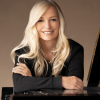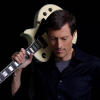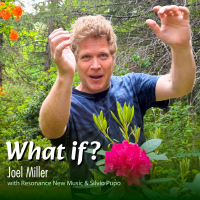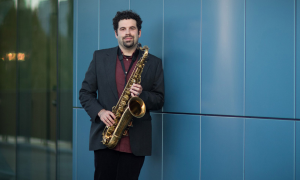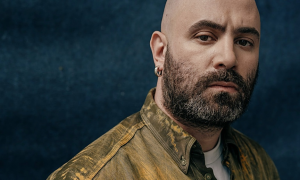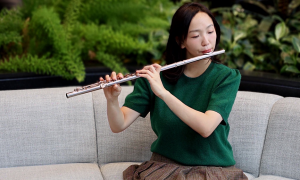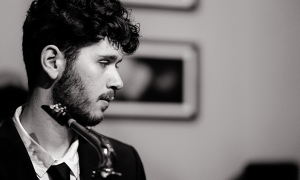Home » Jazz Articles » Take Five With... » Take Five With Lisa Hilton, Revisited
Take Five With Lisa Hilton, Revisited

Courtesy Aaron Regan
Meet Lisa Hilton
Lisa Kristine Hilton is a composer, pianist, producer and bandleader. Growing up on California's beautiful central coast, Hilton was so entranced with the piano that she taught herself to play with a colored keyboard guide and composed simple songs before beginning piano lessons. Attending college in San Francisco, she missed the creativity she had previously experienced in music, so she switched majors, graduating with a degree in art. When Hilton returned to the piano, she remained driven by the passion she experienced when young, but also by her study of art, and it is a unique characteristic often noted: "A deeply expressive style... rich melodies and improvisations... an appealing impressionism." Downbeat Magazine. In the book, The New Face of Jazz (Billboard Books, 2010) by Cicily Janus, it states that Hilton has been "Compared to some of the best pianists in history." Hilton's music is inspired by American jazz greats such as Thelonious Monk, Horace Silver and Count Basie, and bluesman Robert Johnson. Hilton has composed and recorded over two hundred tracks and her albums sit regularly at the top of JazzWeek and other charts annually, and have received millions of streams around the world.Instrument:
My beloved piano.Teachers and/or influences?
Hmm... I grew up in a small town with few teachers or influences other than the cornucopia of music heard in our home. I think some musicians are influenced a lot by others, but my music comes from within and seems to be indifferent to influence! I always try and be influenced by nature, world events and the emotional qualities surrounding us.I knew I wanted to be a musician when...
I didn't really think I could be a musician growing up. What would a girl be able to do if she was a musician? Maybe shake a tambourine and sing, or play violin in an orchestra or be an accompanist? I didn't really envision any future path when I studied music from eight to eighteen, but I knew it was a deep love of mine. Later when I started creating my own music, it was about the time iTunes was being created, so I suppose I have Steve Jobs to thank for helping people like myself find a new life as a musician, pianist, composer, bandleader and producer.Your sound and approach to music.
I always let the music lead me — I never try and make my composing fit a specific idea or concept like you would a school assignment. Creativity comes from within, but you need to nurture it to see what it will form and where you will be led. I take the time that's needed when I'm creating— there are occasions when you can create things quickly, but generally it's best to spend time with music and let it reveal itself to you rather than trying to push it.Your teaching approach
It could be a response to having a difficult teacher in the past, or from my growing up without access to inspirational music teachers, but I feel the path of learning music or art or creativity is an individual path that you need to discover on your own, not necessarily something to teach. For me it would be the same as trying to teach someone how to be in love—it's something you need to experience on your own. Can you imagine someone trying to teach Monk how to compose or John Coltrane how to play or Van Gough how to paint a sky for that matter. The great artists of every era have always had a unique perspective on their art that was not taught to them—they created their own path.Your dream band
For every project I carefully think about my band members, and I always choose to create diversity in a variety of ways. I think about where they grew up for example as well as how they play. I would never put together a band of all similar people from the same city for example. Like a kaleidoscope, the beauty is in the diversity. Also I always choose players who are amazing but... also nice. If I could choose one player from the past, I think I would choose trumpeter Clifford Brown as a band mate because he was so passionate about music, very kind and generous and also a terrific player.Road story: Your best or worst experience
Every performance is a unique experience—I don't really like to judge them as good or bad or worst. I've performed at the chandelier-clad Carnegie Hall several times and Chicago's historic Green Mill too. I like a big stage with a great piano best, but you can have a memorable performance anywhere, anytime. The worst tour experience, without a doubt, was having to cancel our spring 2020 performances. I cannot ever accurately express how that felt and the emotions that were reflected to me as everyone came to their own realizations of what those show cancellations meant not just to them, but the impact the pandemic was beginning to have on the world.Favorite venue
Oh wow, this is a hard one for me. Ok here is my Best Of Venue List: Best Piano—Carnegie Hall; Kindest Staff: SFJAZZ Center; Best View from the Stage: Vibrato Jazz & Grill (West Los Angeles); Venue I'd most like to perform at that I haven't: Walt Disney Hall.Your favorite recording in your discography and why?
Asking a recording artist their favorite album (out of 26 recordings) is similar asking a parent which child is their favorite! As musicians we hear all the issues and strengths, but each album is created with love and passion, work and compromise too. I can say I'm ecstatic about Paradise Cove (Ruby Slipper Productions, 2022) and just love how the music came out and the contributions of the players, engineers and photographers.What do you think is the most important thing you are contributing musically?
I hope to create music that is the soundtrack to people's lives in a positive way. But I also believe it's incredibly important to raise awareness and appreciation for women and their contributions in jazz and music. Women have always been creative and cultural leaders even if they weren't recognized for their talents: composer, pianist and bandleader Lil Hardin Armstrong, wife of trumpeter Louis Armstrong, or piano virtuoso Clara Schumann, wife of composer Robert Schumann easily come to mind here.I am thankful that we are hearing about more women performers in jazz and classical music, but it still remains a fact that in every performing arts center and in every live music venue around the world that presents jazz, classical or opera, we are still primarily listening to music composed by men, most often still performed by men and normally conducted by men. Think about it—when you listen to classical, opera or most jazz standards you are normally listening to music created by men. As a composer, bandleader, producer and pianist, I am proud to be a part of positive change in this area and I hope that the next generation, or the generation after that, will grow up in a world where girls can be in love with the sound of a piano, or a tuba for that matter, and follow their passion without regard to their gender.
Occasionally I perform an 80-minute show of all women composers and when I tell the audience afterwards, there is huge appreciation that I bring this up. Will we hear music composed by women in grand concert halls and jazz clubs around the world, see women in leadership often on more magazine covers, and experience more books and movies created about their fascinating life stories? Stay tuned...
Did you know...
Before my career as a musician I created and co-authored the popular children's book, If Dinosaurs Were Alive Today (Price Stern Sloan), which I wrote with my sister, Sandra L. Kirkpatrick and had it illustrated by Randy Chewning. The book is now out of print, but I recently updated and published it as a digital version by the same name. I think it is handy and easy for a parent to have a colorful children's book stored on their phone or reader now so they can share with their child or grandchild anywhere, anytime.The first jazz album I bought was:
Probably Kind of Blue (Columbia, 1959) by Miles Davis.Music you are listening to now:
I listen to my own recent albums: Paradise Cove, Life Is Beautiful (2022), Transparent Sky (2021), More Than Another Day (2020)—they are good during dinner parties or when I'm doing things around my home. I have been also playing a lot of the early Brad Mehldau and I marvel at the albums Anything Goes (Warner Bros., 2002) and Live In Marciac (Nonesuch, 2006).Desert Island picks:
Billie Holiday Best of Billie; Diana Krall Live In Paris (Verve, 2002); Getz/Gilberto; Brad Mehldau Anything Goes and Live In Marciac.How would you describe the state of jazz today?
When I was a little girl learning to play, I studied "Modern Music" which is now called twentieth century music. Today I feel that I am a composer and performer of twenty-first century music with its influences from all eras and cultures. I believe that in the future this is the name we will give jazz of this era.What are some of the essential requirements to keep jazz alive and growing?
I think anything that is exclusionary is doomed—when we exclude communities by gender, ethnicity or by narrow definitions we hurting the art not supporting it. Recently we are seeing an expanded view of jazz and that is exactly how to keep jazz alive!What is in the near future?
Currently musicians are weighing the balancing act of touring and performing live. I wish we could all be as successful with tour dates as Taylor Swift right now, but we need audiences to return and travel disruptions to calm down before jazz performances can return to pre-2020 touring schedules.What is your greatest fear when you perform?
You can worry about anything, I assure you. When I was relatively new at performing, I learned just before I went on stage that I needed to wait until they could properly seat Quincy Jones. While incredibly thrilled that Q came to my show, it definitely made me nervous! So I decided to play my "best" composition first, (just in case he left early). Well, he was the very last person to leave, and they kept the club open just for him, so I needn't have worried at all.By Day:
I majored in art and design in college, and worked for many years as an art director for mostly film and television. I use my design and art direction skills all the time now overseeing the photography and design on our albums and website and I still really enjoy it. I like to be creative in a lot of different ways.If I weren't a jazz musician, I would be a:
I would always want to be an artist. I feel that music is my art now, but I could go in another artistic direction like painting or photography.If I could have dinner with anyone from history, who would it be and why?
I think I would love to have dinner with all the great women in music that I admire—from Joni Mitchell and Yuja Wang to Lil' Armstrong and Clara Schumann.2020 to 2022 have been difficult years for our world and had specific challenges for most musicians. Looking back, how do you feel you've weathered that time?
I am thankful as a musician and creator that I have been able to continue putting together strong creative teams of musicians, engineers and artists despite the challenges we faced. Each album is extremely collaborative, and I'm lucky to work with so many very talented people every year.Tags
Take Five With...
Lisa Hilton
AAJ Staff
Thelonious Monk
Horace Silver
Count Basie
robert johnson
Clifford Brown
Green Mill
SFJAZZ Center
Vibrato Jazz & Grill
Lil Hardin Armstrong
Louis Armstrong
Miles Davis
brad mehldau
Billie Holiday
Quincy Jones
Diana Krall
PREVIOUS / NEXT
Support All About Jazz
 All About Jazz has been a pillar of jazz since 1995, championing it as an art form and, more importantly, supporting the musicians who make it. Our enduring commitment has made "AAJ" one of the most culturally important websites of its kind, read by hundreds of thousands of fans, musicians and industry figures every month.
All About Jazz has been a pillar of jazz since 1995, championing it as an art form and, more importantly, supporting the musicians who make it. Our enduring commitment has made "AAJ" one of the most culturally important websites of its kind, read by hundreds of thousands of fans, musicians and industry figures every month.


